After the outlandish box-office bombs of John Carter and The Lone Ranger, Disney has set its sights on much safer territory: itself. Continuing the recent tradition of movies-about-better-movies—think My Week with Marilyn and Hitchcock—Saving Mr. Banks portrays Disney’s struggle to produce Mary Poppins despite the reticence of its author, P.L. Travers, to commercialize her deeply personal book.
The screenplay, by Kelly Marcel, has been on the cultish but overrated Black List for some time now, and there’s no denying the nostalgic pull a film about Poppins has. (Alan Horn, chairman of Walt Disney Studios, explicitly referred to the production as a “brand deposit” at CinemaCon in April.) But now we have the first trailer, and our first look at whether the film is more product placement or feel-good story.
Judging from this first glimpse: a little of both. The film looks impressively staged, and the scene where Travers rejects an early rendition of “Chim Chim Cher-ee” brims with humor and verve. But much of it seems safe and cloying. Hanks has for years had a penchant for Oscar-bait roles, and his Disney seems—here, at least—almost generically upbeat.
The rest of the cast almost makes up for it. Alongside Hanks are Emma Thompson, Paul Giamatti, Colin Farrell, Jason Schwartzman, and West Wing favorite Bradley Whitford. It’s hard to entirely mess up a film with actors like that; Thompson in particular shines as the rattled and sarcastic Travers, and she’s saved worse stories than this one.
That story relies heavily on parent-child plot lines: Disney promises his daughters he’ll bring Poppins to the screen; Travers has a complex and troubled relationship with her father. It’s yet to be seen, however, if the movie will insist on a happier ending than the real story had: Travers disliked the 1964 film—especially its use of animation and its musical numbers—and refused to allow any more of the Poppins books to be adapted.
